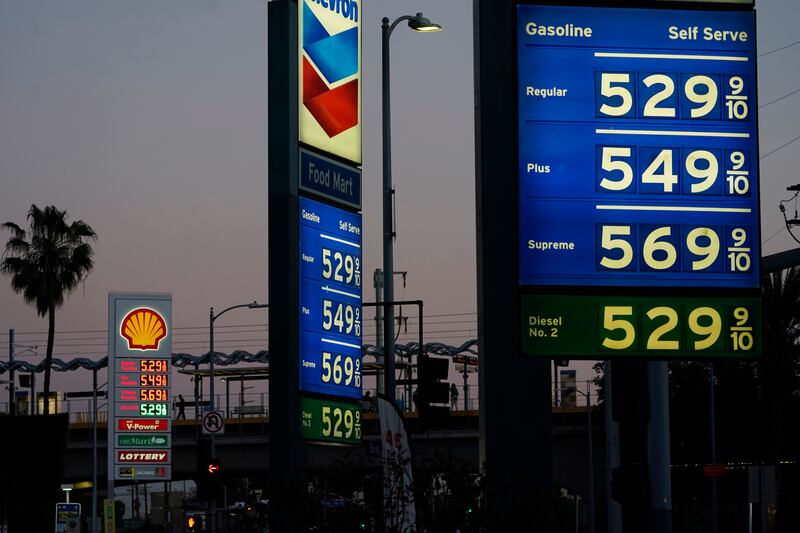On the road to its quest for environmental nirvana, the White House has created a moral conundrum: saving the planet or saving the people living on it now.
So far, we seem to have chosen the wrong path.
Last week, as President Joe Biden spoke in response to Russia’s unprovoked invasion of Ukraine, he said of the sanctions package, “We specifically designed (it) to allow energy payments to continue.”
Daleep Singh, a senior NSC official explained: “Our measures were not designed to disrupt, in any way, the current flow of energy from Russia to the world.”
He went on to say there are no plans to restrict Russia’s energy sector, which powers the country’s economy and is largely responsible for the wealth of its oligarchs.
Amos Hochstein, the Department of State’s senior energy adviser, agreed with Singh when asked by Bloomberg, “What is it going to take … for the administration to hit him where it is going to hurt the hardest?”
Hochstein replied, “if we target the oil and gas sector … then prices will spike, perhaps he would sell only half of his product but for double the price. That means he would not suffer the consequences while the United States and our allies would suffer the consequences.”
Then when the administration finally decided to ban major Russian banks from SWIFT, the international banking system, on Saturday, a senior White House official confirmed to reporters that energy payments would be excluded. The SWIFT move was partly cosmetic. It also means that the U.S. taxpayer will be helping to pay for Putin’s immoral war.
On top of it all, the administration is also poised — as soon as this week — to renege on its promises to Congress and make a deal with Iran largely negotiated by the Russian deputy foreign minister. Could this be one reason why we have excluded energy payments from the SWIFT ban?
It’s reasonable to expect that once the Iran nuclear deal is signed, the U.S. and others will turn to Tehran as an attractive alternative to possible disruption of oil and gas from Russia. Such a move would profanely exchange one human-rights crusher for a worse one.
But there is another choice staring us all in the face.
When he assumed office, the president inherited a United States which, after generations of reliance on oil-rich states in conflict zones, was finally energy independent.
Instead of taking advantage, the administration began to take it all apart, in moves led by Biden’s climate envoy, John Kerry. Opting against a gradual transition, the U.S. waged war on its own energy sector in language laced with moral platitudes.
Now, the administration has a moral obligation to reverse course. The U.S. should turn on the taps and stop placing our nation and its energy needs at the whims of oil rich tyrants.
We aren’t saying that environmental issues aren’t important. On the contrary, both of our religions, Judaism and Christianity, understand that the covenant between God and humanity involves developing and protecting resources on earth. It is a core religious obligation.
Judaism and Christianity also teach, in different ways, that there’s often a higher moral obligation, to save human lives in the here and now.
Kerry doesn’t seem to make that distinction. He said to the BBC this week, that he is concerned about Ukraine, but that “… equally importantly, you’re going to lose people’s focus (on climate change).” And Kerry is far from alone in thinking this way.
For too long, a religious-like fervor gripping the global jet set has focused exclusively on a low-carbon energy future for our planet. This singular insistence on green energy has had an interesting cheering section — led by China.
Late last year, the No. 2 official in the Department of State, reportedly advocated for the administration to oppose the unanimously supported Uyghur Forced Labor Prevention Act in Congress out of a concern for climate change.
Why?
It’s because the United States allowed China to partially monopolize key rare earth minerals (another failure in energy policy), and the solar panels that the administration needs are believed to be produced through forced labor in Xinjiang.
Some of those solar panels will be used to coerce energy-rich African countries to leave their abundant resources in the ground (or undersea in the case of Tanzania) rather than use them to lift their nations out of poverty like the United States did more than a century ago. Ironically, western institutions prefer to force these countries to build massive hydroelectric and solar projects, which will still not provide adequate energy to the nations’ young and growing populations.
The draconian break from American energy to an imagined future easily exploited by every enemy of the U.S. is causing insecurity to grow at a rapid pace all over the world.
“American oil and gas companies should not exploit this moment to hike their prices to raise profits,” the president warned us last week, prompting an immediate response from Mike Sommers, CEO of the American Petroleum Institute, who said, “Our companies would never take advantage of this kind of situation.”
The American people will hold him to his word.
But instead of treating American energy as the problem, it’s time we begin to see it as a blessing from the Almighty to help keep our nation free and to be in a position to help our allies in Europe and elsewhere free themselves from energy blackmail.
Please pardon our own apocalyptic hyperbole but Kerry and company should remember: You can’t save the planet if you’re dead.
As King Solomon says, “it is good to grasp the one and not let go of the other … avoid all extremes.”
Rabbi Abraham Cooper is the associate dean and director of the Global Social Action Agenda at the Simon Wiesenthal Center. The Rev. Johnnie Moore is president of the Congress of Christian Leaders and founder of The KAIROS Company.

